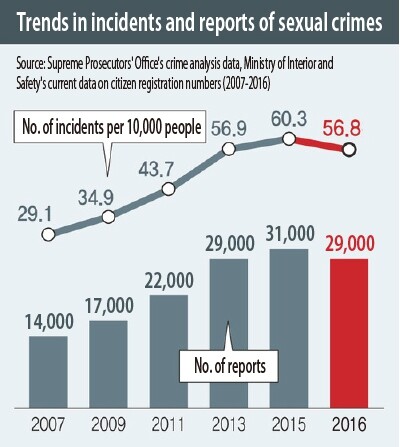hankyoreh
Links to other country sites 다른 나라 사이트 링크
Sexual crimes occur at rate of 3.4 per hour in South Korea

Sexual crimes occur in South Korea at an average rate of 3.4 per hour and 80.4 per day, a Statistics Korea report calculated.
Date rape reports in particular were found to have increased by a rate of over 10% per year since 2015. The percentage of men among workers who receive childcare leave increased by over ten times in a 10-year period, but disparities by workplace scale remained.
A report titled “South Korean Societal Trends 2018” published by Statistics Korea on Dec. 13 calculated a total of 29,357 sexual crimes reported in 2016, including rape, indecent assault, and illegal filming. The number translated into 56.8 incidents per 100,000 people, occurring at a rate of 80.4 per day and 3.4 per hour. Sexual crime reports increased steadily through 2015 before entering a decline in 2016.
In terms of specific crimes, rape reports were found to have decreased while reports of indecent assault and illegal filming increased. Indecent assaults and illegal filming respectively accounted for 48.8% and 17.9% of sexual crimes reported in 2016. A total of 10,303 cases of date rate were reported in 2017, representing an increase of over 10% per year since 2015 – a rate of 19.9 incidents per 100,000 people. The number of sexual harassment reports, which had previously declined from 240 to 205 between 2013 and 2016, jumped to 294 in 2017 amid the MeToo movement. Men accounted for 13.9% of those reporting sexual harassment.
Percentage of men taking childcare leave noticeably increases
A notable increase was also observed in the percentage of men taking childcare leave over the past 10 years. In 2008, just 1.2% of men took childcare leave; as of 2017, the number had climbed to 13.4%. The increase appeared to reflect the effects of stronger government policy measures to encourage men to take leave, including the 2014 introduction of “father months.”
But disparities continued in terms of the size of companies: as of 2017, childcare leave systems were adopted by 93% of workplaces with 300 or more employees, but only 38.8% of workplaces with five to nine.
The findings also showed 49.2% of couples in dual-income households with children under six to feel there was “never enough time.” Among dual-income couples caring for a senior citizen or disabled family member, 44.9% reported being constantly pressed for time. Among working people with commuting times exceeding two hours, 42.1% complained of lacking time, while the percentage dropped to 32.6% for those with commuting times below 30 minutes.
By Jung Eun-ju, staff reporter
Please direct comments or questions to [english@hani.co.kr]

Editorial・opinion
![[Column] Park Geun-hye déjà vu in Yoon Suk-yeol [Column] Park Geun-hye déjà vu in Yoon Suk-yeol](https://flexible.img.hani.co.kr/flexible/normal/500/300/imgdb/original/2024/0424/651713945113788.jpg) [Column] Park Geun-hye déjà vu in Yoon Suk-yeol
[Column] Park Geun-hye déjà vu in Yoon Suk-yeol![[Editorial] New weight of N. Korea’s nuclear threats makes dialogue all the more urgent [Editorial] New weight of N. Korea’s nuclear threats makes dialogue all the more urgent](https://flexible.img.hani.co.kr/flexible/normal/500/300/imgdb/original/2024/0424/7317139454662664.jpg) [Editorial] New weight of N. Korea’s nuclear threats makes dialogue all the more urgent
[Editorial] New weight of N. Korea’s nuclear threats makes dialogue all the more urgent- [Guest essay] The real reason Korea’s new right wants to dub Rhee a founding father
- [Column] ‘Choson’: Is it time we start referring to N. Korea in its own terms?
- [Editorial] Japan’s rewriting of history with Korea has gone too far
- [Column] The president’s questionable capacity for dialogue
- [Column] Are chaebol firms just pizza pies for families to divvy up as they please?
- [Column] Has Korea, too, crossed the Rubicon on China?
- [Correspondent’s column] In Japan’s alliance with US, echoes of its past alliances with UK
- [Editorial] Does Yoon think the Korean public is wrong?
Most viewed articles
- 1‘We must say no’: Seoul defense chief on Korean, USFK involvement in hypothetical Taiwan crisis
- 2N. Korean delegation’s trip to Iran shows how Pyongyang is leveraging ties with Moscow
- 3‘Weddingflation’ breaks the bank for Korean couples-to-be
- 4Will NewJeans end up collateral damage in internal feud at K-pop juggernaut Hybe?
- 546% of cases of violence against women in Korea perpetrated by intimate partner, study finds
- 6[Column] Park Geun-hye déjà vu in Yoon Suk-yeol
- 7“Parental care contracts” increasingly common in South Korea
- 8[Column] Yoon’s first 100 days should open our eyes to pitfalls of presidential system
- 9[Interview] Dear Korean men, It’s OK to admit you’re not always strong
- 10[Editorial] New weight of N. Korea’s nuclear threats makes dialogue all the more urgent